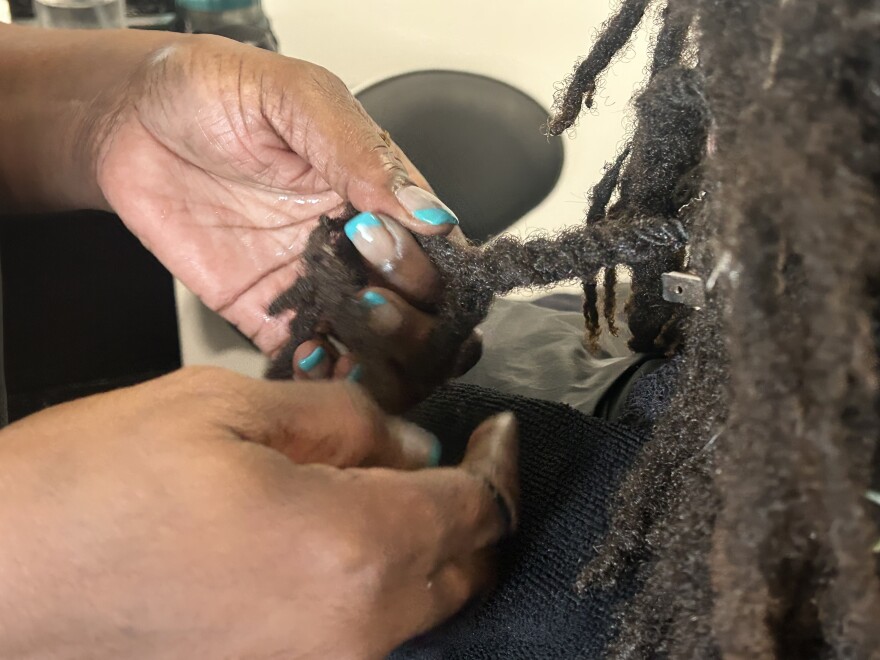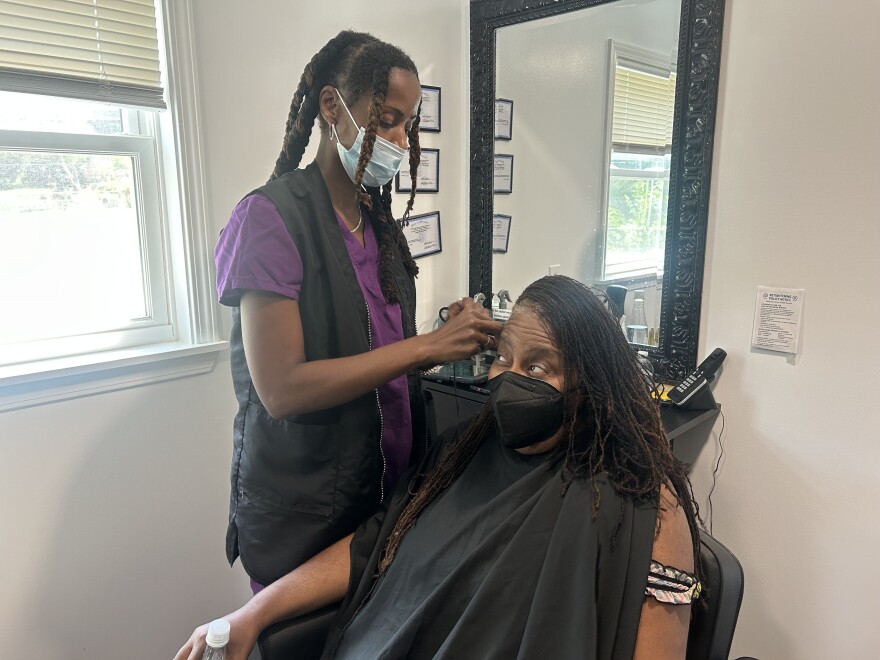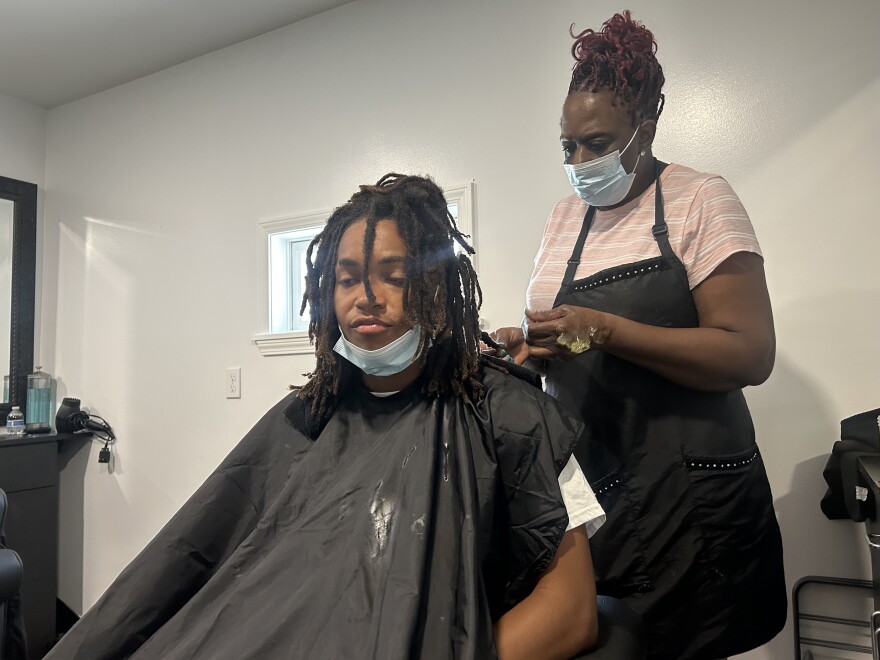It is just after noon inside Your Natural Image hair salon in South Kansas City, Missouri, on a Thursday in July. 16-year-old Cornelius Mitchell has just come from under the dryer.
Mitchell, a Black student at Raymore-Peculiar High School, wears locs. They're black with brown tips that extend just below his broad shoulders. Right now, they are pretty puffy, but once his stylist retwists them as part of his loc maintenance service, the hair will have a tighter, fresher look.
Locs run in Mitchell’s family, he said.
“My sister started growing her locs since she was a toddler," Mitchell said, as his stylist pulled tight on one loc. “And my mom has locs too. She has really long locs.”
Mitchell has been growing his hair for about three years now, investing a lot of time and effort. But during the course of those three years, he has noticed many others were put off by natural Black hair styles.
He said he, and many of his Black peers, have faced bullying at their predominantly white school, and what feels like discrimination elsewhere.
“I’ve seen at work some of my friends didn’t get hired because their hair don’t be maintained,” he said. “Some kids didn’t get accepted to college because of their long hair.”
Mitchell has played for his school football team and said he’s never been kept off the field for wearing locs. While he’s seen this happen to others, he’s never been asked to cut his off.
“I’d be so mad,” said Mitchell. “I took however many years (to grow them out) just to end it because somebody else said so.”

New Missouri Law
Mitchell and others KCUR spoke to at Your Natural Image salon are pleased that Missouri recently became the 28th state in the country to pass what’s known as the Crown Act.
The Missouri Crown Act protects those attending publicly funded educational institutions from discrimination based on hair styles. Sen. Barbara Washington of Kansas City, a Democrat, sponsored the bill.
“They (children) have so many stressors before they get to the schoolhouse, the last thing they need is someone judging them based on the way their hair grows out of their head," she said.
Legislation prohibiting discrimination based on hair texture and style gained traction after a 2018 case involving a Black New Jersey high school wrestler named Andrew Johnson. Johnson was forced to cut off his locs or forfeit his match. He cut his hair but later filed a discrimination lawsuit.
The referee, Alan Maloney, was banned from officiating for two years. The following year, California became the first state to file what has become known as the Crown Act.
Kansas City and St. Louis have passed local ordinances against hair discrimination. They go farther than the Missouri law, which covers cases in K-12 schools and colleges. The city ordinances also protect employees in the workplace.
Rep. Washington said the struggle for protection like that offered by the Crown Act is a long time coming. Black hair, she said, has always been seen as unbecoming outside black spaces.
“Afros in the 70s were considered militant, braids and dreadlocks are considered less elevated than one who wears a chemical or permanent in their hair,” she said.

An issue for generations
In a small room opposite Mitchell, Lashaun Gleese Briggs, the owner of Your Natural Image, is braiding a female client's locs. Briggs has been in the hair business for about 20 years and has seen an evolution in styles.
In cosmetology school, Briggs said she straightened a lot of Black hair with chemicals to accommodate the European standards her clients preferred.
“In school, we had to do everyone's hair with relaxers, perms, Caucasian perms, curly perms,” she said, as she twisted an 18-inch long loc on her client's head. “And then, once I got out of school, I specialized in natural hair.”
That’s because she saw what the products did to her clients’ hair over time. She made a decision to only style natural hair, giving up the chemicals. But the shift took some time to catch on with her clientele. She heard over and over that people were afraid of pushback if they were to show up with braids, locs, or other Black styles.
“I had clients who would straighten out kind of often,” said Briggs. “I had a client who was an attorney. She would always straighten her hair when it's time to go to court because she felt that she would look more presentable if she were to straighten her hair out.”

Another of Brigg's clients, Rhonda Beene, 59, said she has made accommodations in the past so as not to be judged for wearing a natural hair style.
“I was hesitant to go into an interview environment with my fresh new locs, although I loved them,” said Beene. “I debated about whether I should wear a wig in one interview. I did wear a wig, and I did not feel comfortable in my own skin.”
The issue of hair has been a longstanding problem for Beene, who said ever since she was a child, she’s faced judgement. Whenever she would embrace her natural curls rather than use relaxers and straighteners, she faced embarrassing and uncomfortable questions from her white peers.
“How do you make it stand up the way that it does?" people would ask her. Or “Can I touch your hair?”
A matter of health
Beene said her journey to natural hair was largely about embracing her culture and heritage — a kind of self-love. But it was also a matter of health.
“I started hearing about some of the dangers that they thought might be associated with relaxers," she said. “As I moved toward the Big Chop (completely cutting the hair off), I started extending the time between when I would have a relaxer.”
In 2022, the National Institutes of Health (NIH) published the results of a study about the risk of uterine cancer for women who regularly used chemicals to straighten their hair. The National Institute of Environmental Health Sciences, part of NIH, studied 33,497 women over the course of 11 years.
Over that time 1.6% of the women who did not have chemical hair treatments developed uterine cancer. But for the women who frequently used chemicals to straighten their hair over the same time period, the percentage bumped up to 4%.
Another 2019 study by the National Cancer Institute confirms that uterine cancer presents in Black women at significantly higher rates than non-Hispanic white women, Hispanic women and Asian-Pacific Islander women.
Salon owner Briggs, finishing up Beene’s hair and overhearing the conversation, shakes her head in dismay. “I don't do anything with those types of chemicals,” said Briggs. "The only chemical that we offer at Your Natural Image is color.”
Meanwhile, Cornelius Mitchell's hair is almost finished after over an hour in the chair. His stylist is using a palm roll technique to finish up.
Mitchell says, he may be done, for now, with locs.
“To be honest, at the end of senior year, I'm gonna probably cut them going to college, just a fresh new start,” said Mitchell.
But as he heads off to college in Missouri, he says, again, how glad he is there is a new law that protects him and his friends, whatever hair style they choose.





